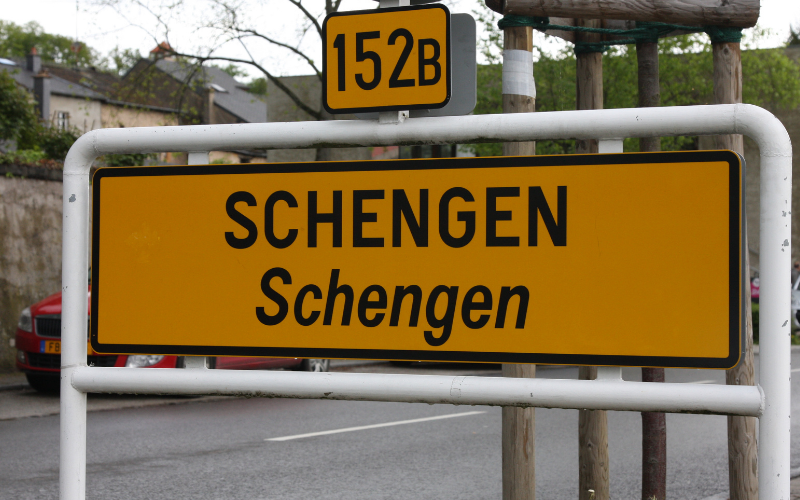Bulgaria's path to Schengen: What would be the benefits of membership in the visa-free area?

Phased entry into Schengen - this is a possibility for Bulgaria and Romania after Austria proposed for both countries to abolish border checks at airports. Joining the so-called "air Schengen" is seen as a success for Sofia and Bucharest, with expectations that a decision on land entry will soon follow. There are practical objectives behind Schengen membership, not just diplomacy and negotiations. Will there be economic benefits if borders are opened by air? What does our economy lose and what will it gain if we become part of Schengen - interview by Iva Stoykova with Adrian Nikolov, senior analyst at the Institute for Market Economics (IME).
BNT: What does joining the so-called "air Schengen" mean - only no queues at airports or does it have a deeper economic effect?
Adrian Nikolov, senior economist at IME: "This division is quite strange. Unfortunately, in such a situation we will miss a large part of the positive economic effect, as waiting in queues at airports is the small problem. It is obviously felt by hundreds of thousands of travellers every year, but for me at least the more important effects are for business, as air traffic doesn't matter very much there. It is the opening up of borders that will play a big part, and on two fronts. Always waiting at the borders costs money, because paying the wages of drivers who sit and do nothing during that time to get from A to B also costs money. Security is the big issue. At the moment, crossing borders is always a big question mark - it could take three hours, it could take 30. Which makes planning on the business side very difficult. If we are in Schengen, that is largely eliminated. The big question is what we do about the border with Serbia - that is the big corridor that leads from Turkey through us, our business to Western Europe, to our main trading partners. But it is very likely to make traffic through Romania much more intense, precisely because of this greater security. That is to say, we know that the border with Romania does not exist if the Romanians, together with us, are accepted, and this automatically opens up the border with Hungary. This is why discussing air Schengen in huge quotes from an economic point of view is not that interesting. We are saving some 20 to 30 minutes per traveller, but that is not time that can be used efficiently in terms of economy. Whereas opening the borders on land would have a very significant effect in terms of security and savings for businesses."
BNT: Romanian authorities have repeatedly pointed out that they are losing billions because they are not Schengen members. Are there similar calculations for Bulgaria?
Adrian Nikolov, senior economist at IME: "We ourselves have made similar estimates. There is literature on the issue, mostly from older Schengen members, where the effect is due to geographical proximity, historical links are greater. Conservative estimates are that Schengen membership alone leads to an increase of between half a percent and one percent in exports to the other Schengen countries, which for us would mean somewhere between half a billion and a billion BGN more exports. That is more or less what we lose every year. It is very important to bear in mind that we are talking about dynamics here. That is to say, this is an effect that accumulates over the years. And the more we delay, we miss out on each successive year in which this positive effect can accumulate."
BNT: Which sector will get the biggest boost if Bulgaria joins the Schengen area?
Adrian Nikolov, Senior Economist at IME: "Along with exports, it will boost everything else. Our industrial enterprises are mostly oriented towards business relations with Western European partners. Italy is a very big market for our industry, Germany too, especially for intermediate products. Along this line, we are actually generating more employment, more economic growth, practically the whole country, all these things are connected. If we talk specifically about economic sectors, the ones that are most heavily weighted towards Western Europe as the biggest markets, the automotive sector, something that we cannot help but mention, because we have very well positioned companies recently that are involved in intermediate products, from the production of cables through to some larger parts such as handlebars. But in general, there are many Bulgarian companies that will not feel the effects of Schengen, especially in terms of security and this expectation that there are no borders. Of course, this would also lead to an improvement in the investment environment, because participation in Schengen itself is a very serious external sign that Bulgaria is a safe country that can be relied on, that the institutions work as a whole. Which at this stage is a serious obstacle to our investment image. Together with the euro area, the major rating agencies have pointed this out as one of the requirements for our credit rating to be upgraded. Which automatically means that investors have more confidence in us, which would mean that more companies would target our market."
BNT: Would a possible partial acceptance, or so-called air Schengen, have a positive effect on tourism?
Adrian Nikolov, Senior Economist at IME: Most probably yes. We have to keep in mind that tourism is still recovering from the Covid pandemic. Fortunately, we've seen some very good figures from the summer of 2023, where even without the Russians and the obvious changes in the macro environment, we're already reaching the 2019 figures. The big question is whether we'll be able to attract tourists from Western Europe. Brexit is a very serious negative with the return of visas for Brits. But then again our tourism business is doing better and better. Obviously any lifting of restrictions and requirements on tourists would have a beneficial effect. The question here is whether our businesses are prepared to accept more as they increasingly operate over its capacity.
BNT: If we can summarise, what are the economic benefits of Schengen membership?
Adrian Nikolov, Senior Economist at IME: More security for businesses, clearer working conditions, no waiting at borders, savings, higher exports and an improved investment environment. And of course, last but not least, fewer queues at airports for people who travel every day and every hour.
BNT: Is there a need for any change in Schengen, any reforms to be able to meet the demands and needs of the single market and business?
Adrian Nikolov, senior economist at IME: "This is more for the political and organised crime analysts, because this is the reason why Bulgaria has been delayed for so long, the confidence of several Schengen states is that we are actually able to secure the external border. This system has been subject to a lot of criticism and correction - we saw in the migrant crisis, we saw in the course of the Covid pandemic, when the borders were very quickly raised again, within the Schengen area, some individual countries started to reapply border controls where there were none. It is probably this type of crisis situation that needs to be dealt with in a more meaningful way, to know how to act at such a time, rather than each country deciding on the basis of its own desire and its own priorities. Schengen is, after all, a universal space that takes the common decision, it is right to have such methods of work."
Get the latest news wherever you are!
Follow us on
Facebook
and
Instagram
Follow BNT’s YouTube channel
You can now also watch us on
TikTok
Find us on
Google News























